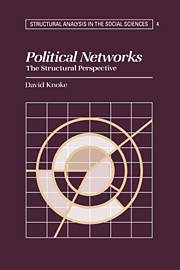Book contents
- Frontmatter
- Contents
- List of tables and figures
- Preface
- Acknowledgments
- 1 Politics in structural perspective
- 2 Voting and political participation
- 3 Social movements (written with Nancy Wisely)
- 4 Organizational power (written with Naomi J. Kaufman)
- 5 Community power structures
- 6 Elites in the nation state
- 7 International relations (written with Jodi Burmeister-May)
- 8 Toward a structural political economy
- Appendix: Some fundamentals of network analysis
- References
- Index
2 - Voting and political participation
Published online by Cambridge University Press: 02 October 2009
- Frontmatter
- Contents
- List of tables and figures
- Preface
- Acknowledgments
- 1 Politics in structural perspective
- 2 Voting and political participation
- 3 Social movements (written with Nancy Wisely)
- 4 Organizational power (written with Naomi J. Kaufman)
- 5 Community power structures
- 6 Elites in the nation state
- 7 International relations (written with Jodi Burmeister-May)
- 8 Toward a structural political economy
- Appendix: Some fundamentals of network analysis
- References
- Index
Summary
At the heart of politics in liberal democratic societies lies participation of ordinary citizens in selecting government officials and engaging in efforts to shape public policies. Two paradigms dispute the function of citizen involvement in creating and sustaining the democratic polity. Elite democratic theorists argue that the electorate's role is restricted to choosing leaders, who must then be left alone to govern without pressures from the populace (Schumpeter, 1943: Riker, 1982; Sartori, 1987: 108). Electoral majorities should control officials only through the threat of loss of office during periodic, contested elections. To permit popular access to day-to-day decisions of the government risks a mass society in which political elites are stampeded by the irrational whims of the crowd (Kornhauser, 1959; Halebsky, 1976). In contrast, populist theories of democracy require that the citizenry interact continually with officials about their public policy concerns (Pateman, 1970; Barber, 1984). Local participatory arenas – grass-roots parties, voluntary associations, industrial workplaces – provide institutions for aggregating popular preferences and practical opportunities for citizens to acquire democratic norms, skills, and experiences. These civic education functions of U.S. civil society have been remarked upon by political commentators since Tocqueville (1945: 115). Rather than threatening a delicate equilibrium, mass participation is seen as an indispensable ingredient for preserving democratic governance.
Both the elitist and the populist versions of democratic theory regard citizen involvement in political institutions as a significant problem. Most empirical assessments assume some model of individual decision making about voting and contacting of government officials.
- Type
- Chapter
- Information
- Political NetworksThe Structural Perspective, pp. 29 - 56Publisher: Cambridge University PressPrint publication year: 1990



